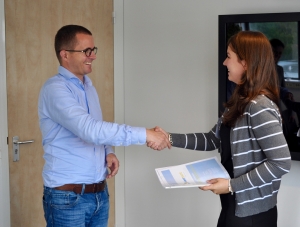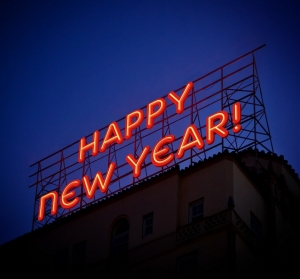Chris Potter
Once you’ve walked out of the door from an interview for a marketing or events job, the temptation is to either try to forget about it and plunge back into your current role, or spend days worrying and checking your phone for missed calls. But there are ways you can be proactive and enhance your chances of success - for this job, and for other interviews in the future.
Immediately after the interview ...
We suggest building an hour after the interview into your schedule, so you can head to a nearby cafe, reflect and take some immediate actions.
Give your feedback - to your recruitment agency
If your interview has been arranged via a recruitment agency, like Regan & Dean, call as soon as you can to let us know how you felt the interview went, and reconfirm your interest. It’s always helpful if we can let the interviewer know if you felt it went well and what your first impressions were. And the quicker we can give them the feedback the better - it shows proactivity and interest from your side - and can add to the overall impression they have of you. So always feedback to the agency as soon as possible - ideally as soon as you are out of the interview.
Our experience is that if the client has to chase for feedback to hear what a candidate thought of an interview, they’ll feel that the interest and enthusiasm for the role isn’t there - so always, always let us know how you think it went .. and do this as soon as possible. Immediately if you can.
It’s also an opportunity for you to feedback those things you felt didn’t go so well - if you felt your nerves got the better of you, or if you didn’t mention a brilliant example of your work that would have been good for them to know about. As the intermediary, we can feedback additional elements like this, to champion your cause.
Send a follow up note/thank you - if it’s a direct application
If you applied directly for the role, you might consider sending an email to the interviewer thanking him or her for inviting you to attend and reconfirming your interest (if you are still interested).
You might want to expand on an answer you gave or provide a better illustration of, for example, a marketing campaign you led from start to finish. That’s fine if you can do it concisely. But avoid a long email of justification, apology or explanation - that won’t do your case any good.
A brief follow up note is more than good manners. It gives you another opportunity to make a positive impression if you do it well. Use it to reconfirm your positive interest in the role, and your professional manners in thanking them for their time.
Note: You wouldn’t normally do this if you applied via a recruitment agency. If in doubt, check.
Reflect
Spend some time over coffee reflecting on the interview. What went well? Which answers seemed to land well? How could it have gone even better? Were there any questions that caught you off guard? If so, make a note of them now. If you get a second interview, these notes will be invaluable for your preparation.
Don’t beat yourself up for any mistakes - see this as an opportunity to learn. If you felt you didn’t know enough about the company, you now know you need to do more research before the next one.
NLP practitioners say “There is no failure. Only feedback”. Approach your reflections in this positive way.
Plan a reward
Consider a small treat to reward yourself for preparing well for the interview. Pick whatever works for you, whether that’s a pumpkin spice latte, a book, a movie rental or a large gin and tonic! It’s important to give yourself a pat on the back… most people will have experienced some stress prior to an interview… so now .. relax.
And later ….
Get Feedback
Always try and get specific feedback on your performance, generally as an interviewee, and specifically regarding your appropriateness to the role and fit to the company.
If you’re working with a recruitment consultant, they’ll be the ones to get the feedback for you (as much as they can get from the client) - and particularly they’ll be trying to find out where you ticked the boxes, or any areas of underperformance. All feedback is useful - so embrace it, even if it is not what you were hoping for. It will always be useful for future interviews.
Remain focused
The excitement of the possibilities of a new job can become a distraction from your current role. The last thing you want is to be pulled up for mistakes or a lack of enthusiasm so stay focused on delivering your current objectives.
Keep applying
Even if this is your dream marketing or events job and you can’t imagine working anywhere else, don’t put all your eggs in one basket. It’s important to stay active with your job search and maintain momentum.
It’s good for your morale too. If you don’t land this role, having one or two possibilities in the pipeline will reduce any disappointment. Remind your recruitment agency to let you know about other similar roles and be proactive with your own job search too.
Prepare for next time
Look at your notes from your period of reflection. Are there any questions that tripped you up for which you can prepare a better answer now? Are there any gaps in your CV or LinkedIn profile that were brought up or questioned? Make time to address them now, when you don’t need to rush.
Be patient
It is easy to become impatient when you’re waiting for a response to a job interview, but you never know what the internal processes are for the business. You might get some clarity by asking about the process, next steps and timescale at the end of your interview - and we’d encourage you to do this - but even then there may be unforeseeable delays.
Some managers have the authority to make a hiring decision on the spot, while others need to go through a chain of approvals first. Or they may have other interviews stretching over a longer period. A slow response doesn’t necessarily mean a negative outcome; there could be all kinds of red tape involved before a final decision is made.
A follow up call with your recruitment agency to clarify timescales is always good.
Keep in touch
If the timescales for feedback and next steps are long, make sure you keep in touch with any changes in status from your side. If you are being invited to another interview (particularly if it’s a second interview) for a different role or company, let your consultant (or if applying direct, the employer) know. This can help them manage or modify timelines on their side if things become critical.
A good marketing and events recruitment agency like Regan & Dean can help take some of the stress out this whole process for you. We’ll keep in touch with the interviewer and let you know what’s happening as soon as we can. And you can always be sure of a friendly voice at the end of the phone, and someone who is there to support you and the employer throughout the process.
It has been said that many interviewers will make a decision about whether someone is right for the job within the first five minutes - so it’s imperative that you make a great impression from the offset. Here are some of the basics we recommend to our candidates to ensure they shine, right from the start.
Dress to impress
What you choose to wear at an interview is important, as it shows how professional you are and how much effort you have put into the interview. Your outfit should be smart, clean and good quality. If you don’t have a suit in your wardrobe, it is worthwhile investing in one, as it will definitely help you to make a good impression. It doesn’t matter what type of marketing or event management role you are going for, even if you might be able to dress casually once you’ve got the job, you should always dress professionally for the interview.
Check out our blog on this subject here: What should I wear to my job interview?
Use eye contact
The interviewers are not only looking for someone who has the skills and experience for the job, they also want to recruit someone who they get on with. If you walk into the interview looking at the floor or only make eye contact with one person, it will show disinterest and a lack of confidence. You should always try to make eye contact with each interviewer as you walk through the door. A reason we sometimes hear from our clients when they are rejecting a candidate post-interview is that they ‘lacked engagement’ - and eye contact can play a key part in that.
Smile
Everyone looks better when they smile and it feels good too. We relate better to people who look happy and who seem pleased to see us. This is particularly important in the first five minutes as it will help make a positive impression straight away. A smile shows that you are enthusiastic, confident and happy to be there, and it will also help to relieve any anxieties you may be feeling.
Firm handshake
You should always shake hands with the interviewers and make sure it’s a firm handshake, without being over the top. A firm handshake shows confidence and it can help to create a positive initial impression. A limp handshake can come across as being nervous or intimidated, so keep this in mind when you are introduced to the interviewers.
Some body language books suggest trying to take an upper or lower hand position when shaking hands. Ignore them! This is not the time to be playing power games.
Build rapport
You can build rapport within the first five minutes of an interview by simply being yourself and coming across as natural and at ease. Interviews are not just nerve wracking for the candidate, the interviewers can also feel uneasy, especially if they don’t have much experience. In many cases, interviews aren’t carried out by HR, they are undertaken by managers who will be dealing directly with the candidate on a day to day basis. If you seem at ease and comfortable, you will help the interviewers to relax too, which will make for a successful interview.
Be prepared
Stalling on the first question will make you and your interviewer feel a bit awkward so it pays to be prepared. It could be the first formal question will be something like “Tell me about yourself” so it’s worth preparing a two minute career biography in advance. Or it could be “What do you already know about the role/the organisation?”, or “Tell me about your current role”. Being well prepared for these more factual opening questions will set you in good stead for the rest of the interview.
Beware the preamble
Although very few interviewers will deliberately try to catch you out, remember your interview starts from the time you walk into reception. Don’t save your charm for the interviewer; smile at the receptionist too. I know of one glorious case where a man treated the woman on reception very poorly only to discover she was the interviewer who had come out early to greet him!
Similarly, you may be asked some sort of icebreaker question as you settle down, such as “how did you get here?” or “did you find us okay?” Don’t slip up on these apparently innocuous questions; you’ll impress no one if you spend ten minutes complaining about the M1 or criticising the company’s inadequate signage.
Remember the old advertising slogan: You never get a second chance to make a good first impression. So make sure your first impression is positive and you’ll be much more likely to get the chance to make another great impression - by being invited back for a second interview! Good luck!
7 Ways to Secure a Promotion
If you feel that you want to take the next step in the career ladder in your work, you need to be able to impress those above you. A promotion won’t just be offered to you, you need to show that you are capable and deserve it. Particularly in the busy working environment of an events or marketing department it is all too easy to lose sight of the bigger career picture.
Here are just some of the ways you can secure a promotion and take your career to the next level.
1 Exceed expectations
It is important to remember that in order to get a promotion, you need to be able to show that you are capable of carrying out the role you’re aiming for. This means that rather than just meeting with the needs of your current job, you need to be able to exceed the expectations of your superiors. If you are consistently exceeding what is expected of you, you will stand out and it is highly likely that your manager will notice - particularly if you mention it in your one-to-ones! Keep a record of your achievements - and make sure your boss knows just what you’re capable of.
2 Be responsive
We have probably all experienced those people at work who are always ‘too busy’ to answer emails, take calls etc. Too busy with what? These employees will be noted for the fact that they are unresponsive and inflexible, and this is never a good thing in any organisation. If you want to give yourself a good chance of securing a promotion, always be responsive and don’t use the ‘I’m too busy’ tagline as an excuse for not getting back to people.
This doesn’t mean say ‘yes’ to everything. That’s a fast track to becoming a dogsbody. But if a request exposes you to a new part of the business or develops a new skillset, show willing - and grab the opportunity.
3 Help others
If there are times when your workload is quiet and your colleagues are overwhelmed, always be willing to lend a hand. If anyone asks a question, don’t just roll your eyes and say you don’t know; try and help them as much as you can. The more you help others, the more noticeable you will become for all the right reasons. If your boss sees your colleagues respecting you and looking to you for answers, they’ll respect you more too.
4 Volunteer for projects
Most organisations will have fixed term projects from time to time and will ask for people to join the project group. This can be one of the most effective ways of getting noticed by the top management. Most projects need communications support, so your skills in marketing or events would be considered very valuable.
Don’t hesitate to offer to lead a project if it feels achievable, even if it’s outside of your core role. Successful delivery of a project can make a massive difference to your profile and career.
5 Be positive
Negativity is really harmful within any business and it can quickly start to affect everyone and drag them down. It is important to try and always maintain a positive frame of mind and stay clear of any gossiping. Don’t be dragged down by the negativity of other people, as difficult as that may be. Those who stay loyal, positive and professional in tough times will often be rewarded when opportunities arise.
6 Make suggestions
If you want to become indispensable to your organisation and get that promotion, it is a good idea to come up with ideas and suggestions about improvements for the business. Whether these are taken on board or not, it shows you have a genuine interest in the business and your manager will be impressed that you are showing initiative.
Pitch your ideas carefully as you don’t want to be seen as being overly critical of the current state of things. A good approach is to say something like, “I see xxxx is working really well and I thought it might be even better if we did yyyyy”.
7 Ask for it!
If you have been overlooked for promotion, it may simply be down to the fact that you haven’t expressed an interest in moving to the next level in the business. It is always worthwhile having a chat with your manager to let them know that you are looking to progress and to keep you in mind if opportunities arise. If your manager doesn’t think you are interested in moving up, they might make the wrong assumption.
These 7 steps will not guarantee you get a promotion but they will certainly help. Sometimes, however, you may find that you’ve been pigeon-holded into a role with your current employer and need to look elsewhere for the next step in your career.
Which is when you should talk to Regan & Dean.
Have you been working in the same event management role for a few years and wondered what you need to do to take yourself to the next level? Perhaps, if you’re honest with yourself, you’re enjoying ‘coasting’ in a job you know well and can do with your eyes closed. Or perhaps you are unsure about where you want to go and how to get there.
If you feel you’re stuck in your current role and need a change, there are some important steps you can take to reach your desired goals.
Create a plan
With anything in life, you need to have a good idea of what you want, in order to be able to achieve it. If you are looking to go to the next level in event management, it is time to gather your thoughts and create a plan.
You may be currently working as a hands-on Event Manager and want to secure a management role. Or you may already be at management level, but looking on to the next challenge. Whatever your goals may be, put them down in writing and work out what steps you need to take to get there.
Think short term, medium term and long term. If the long term plan is to launch your own event management agency consider the career steps that will get you there.
Keep it flexible. Life always throws surprises at us - some positive and some negative - and you need to be able to respond to them. It’s important that you don’t feel you have ‘failed’ if you’re not an events manager within three years - your priorities can change.
See what’s out there
If you’re in a role it’s often difficult to have a broader idea of what other roles (and their responsibIlities) are out there - and a great way to do this is to read lots of job adverts for the sort of roles you are aiming for long term. Most good job adverts for events or marketing roles will have a list of the key experience and skills that level or role needs - and this will really help you plot a path for your own development (we’d recommend signing up for job alerts on our website to get the latest roles sent direct to your inbox).
Close competency gaps
Then think about the skills you need to develop in order to secure the next role. It’s always worth thinking two career steps ahead - what experience or learning do you need in your next role to secure the one after that? If your plan is to be a corporate events director in four years’ time make sure your next role includes exposure to budget management and chairing meetings for instance.
Ask your current employer to work on special projects that will expand your experience. And if you can’t develop the experience in the job, consider volunteering for community projects that might help (e.g. the Round Table firework and bonfire display to get experience of risk assessments).
Make your aspirations clear
Some employers assume their employees are happy and leave them to get on with their job. They won’t actively try and move them on, sometimes subconsciously making assumptions which mean they restrict people’s opportunity for career progression (e.g. Steve’s done a lot of travelling so he won’t be interested in this UK-focused role). It’s worth sharing your ambitions with your employer so that when a good opportunity comes up they know you might be interested. If you have performance reviews, this is a good time to inform your manager of your future plans. It may be that there is already an opening you can move into or they may be willing to help you fill any skills gaps. You never know until you ask.
Build your brand
Consider your own personal brand and how you are perceived by colleagues, bosses and potential employers. Are you perceived as a creative thinker who brings new ideas to every event? Or a ‘right laugh’ who will brighten up any event but perhaps isn’t so great on the strategy. Perceptions become reality; but they can be managed. Think about who is in your network and build the contacts you need to help move to the next level. Write blogs or LinkedIn articles that demonstrate the expertise people may not appreciate you have. Dress and behave as if you are already in the next job in your career plan.
Keep updated
In order to be the best in your field at anything and to progress to the next level, you need to keep up-to-date with your sector through continuing professional development (CPD). With event management, you should ensure you are always finding out about any changes, which may include new legislation relating to public events, or the launch of new event management technology that can make your events run more easily or more slickly. Demonstrating your continuing professional development is clear evidence of your commitment to your chosen profession. Keep a record of everything, from reading to webinars, and if you are choosing a course it’s worth checking if they are registered for CPD hours. You may be surprised how many are.
Work with a good recruitment company
If you’re serious about your career in events management it makes sense to be registered with a recruitment agency that specialises in events jobs. Regan & Dean has been placing events professionals into new roles for more than 20 years, so when you’re looking at your next move in events, you should be talking with our events team.
The reality is that when your CV lands in the inbox of a recruiting manager it will most likely be alongside many others. Particularly for roles in Events that traditionally attract a lot of applications. And, as the manager will have a clear idea of what they are looking for and limited time, many won’t spend more than a few minutes for this initial CV review. There’ll most likely be a ‘yes’ pile and a ‘no’ pile. So, as a job seeker, and particularly if you are an event manager, it’s important that your CV makes an immediate impact for the right reasons - and gets into the ‘yes’ pile straight away.
If you have the skills and experience for the event management jobs you’re applying for, but you don’t get an interview, the chances are there are some simple reasons why, starting with your CV. We’d always recommend conducting a thorough review of your CV at the start of any job search - but it’s also worth running it through a quick ten-minute health check several times during the year. Why not do it now?
Here are some of the quick fixes to look out for if you have just have 10 minutes to spare.
1 - What impression does it make in the first 60 seconds? Look at your CV as if you were looking at it for the first time. Is it laid out well? Are the fonts used consistent and professional? Do you use wordy paragraphs - or headers and punchy bullet points? In an industry like event management where being organised is key, you’ll be expected to have an idea of good, clear, accessible layout, so make sure your CV demonstrates that you do. (1 minute).
2 - Does your personal profile create RELEVANT interest? If you start your CV with a personal profile (something we’d normally recommend) does it compel the reader to read on? Does it summarise clearly your professional offering? (eg An Event Manager with 4 years’ international experience…) Does it describe the real you? (eg A highly motivated and tenacious leader…) Or could it be describing any events professional? (2 minutes).
3 - Check for any gaps in employment or study - Employers and recruiters will spot any date inconsistencies on your CV so make sure you spot them first. If they are mistakes, correct them. If they are real gaps explain what you did. A one liner with the key dates is sufficient if it is a non-work activity such as travel. If your CV raises more questions than answers in the first review, and others’ CVs don’t, yours is the one that is likely to be passed over. (2 minutes).
4 - Most recent employment first - Employers and recruiters will expect to see your most recent job first - and then be able to follow clearly and easily each of your subsequent roles back to your education. Make sure they are all there, from most recent back, clearly showing the company and the role, and that the dates are correct. (1 minute).
5 - Ask someone else to proofread it. This can be a CV killer! It is very hard to fully proofread your own work and a spellchecker is not infallible. Get someone else to check it out - ideally a friend, relative or partner who knows their grammar and spelling. If your CV does contain an obvious typo, it can put you immediately into the ‘no pile’ particularly for event management roles. Sad but true - so don’t let that be the reason your talents don’t make it to interview. (1 minute to ask and around three days to argue about the feedback!).
6 - Are your latest achievements on there? Can you provide quantifiable evidence of your activities in your last two or three roles? Have you got your recent events on there? Have you included the best example of your effectiveness and results in your most recent role? (2 minutes).
7 - Is your training record up to date? - Have you included the latest courses you’ve completed? If you’ve just completed a risk assessment course, or qualified in PRINCE2 get it on the CV. (1 minute).
Giving your CV our 10 minute check over will help keep your CV fresh and on the mark - but if it does need serious amending that could and should take you longer! And before you submit it for any specific job, always spend some time customising it for that role, highlighting particularly relevant experience. It really will make a big difference.
Your recruitment consultant at Regan & Dean will always review your CV with you, and give you feedback before we submit your CV for a role. We like to make sure our candidates end up in the ‘yes’ pile! And we hope our 10 minute check helps you help yourself too.
Ever since the 2008 global financial crisis, employers that can offer reasonable secure positions have found themselves in a strong position when it comes to attracting the best people. But in every economic cycle, there is an eventual recovery. One trend that seems to catch many employers by surprise after an economic downturn is the exodus of talent once circumstances start to improve. This should not be unexpected; many employees will hunker down in unfulfilling jobs during difficult periods, biding their time until the risks associated with leaving a secure position are reduced.
For jobs such as events managers where, in a positive market, demand for the very best often outstrips supply, this can be a real challenge. So how sure are you that you’ll be able to retain your best events professionals - and attract new ones?
Here are a few areas to consider:
Challenge and autonomy
Event managers are stimulated by the challenge of new kinds of events and projects. There is some comfort in doing the same or similar events a number of times, but life can become unchallenging and predictable if that is all there is to do. Where practical, find different kinds of events to test your event managers’ mettle and if you employ more than one events professional consider rotating them between different events, or taking on different areas of responsibility, or introducing line management opportunities.
Give event managers the space to do things their way, with your support. Like any professionals, event managers are very proud of their expertise, appreciative when their expertise is recognised and can be prickly when it is not!
Appropriate and fair reward
If money is all that makes the world go around, attracting talent would be as simple as offering the highest salary. As we all know, it’s far more complicated than that, and organisations that offer relatively modest salaries can attract good people for all sorts of reasons.
But once an employee feels they are being taken advantage of, or dealt with unfairly compared with colleagues, a bond of trust is broken and is unlikely to be reestablished. So always be fair and equitable.
Considering non-monetary benefits such as flexible working and some form of recognition for the many extra and antisocial hours those working in events management often put in to ensure a successful event, can go a long way to retaining loyalty.
Development
Event managers will want tangible evidence that their careers are going somewhere. This might be as formal as a career pathway scheme or could simply be a commitment to fund their continuing professional development.
As this famous apocryphal exchange illustrates, personal development benefits all parties:
CFO to the CEO: What happens if we train all our event managers and they leave?
CEO: What happens if we don't train them and they stay?
Positive environment and culture
Event managers are full of creativity and thrive on busy, challenging environments. Highly professional, they still expect an upbeat culture in which success is celebrated. Event managers also want to feel part of a community that is making a difference, which is why positive values and corporate social responsibility initiatives are particularly important, as well as non-work opportunities for team building.
Personalise where possible
Not everyone in the workplace wants the same thing, particularly now that there can now be up to five different generations working in the same organisation. There are some basics to get in place, as described in this blog, but consider what you can do on a one-to-one basis to make the organisation more attractive, even if you have to start with your top tier of performers.
The importance of the line manager
It is often said that people join organisations and leave bad managers. Line managers represent your organisation to your employees on a day-to-day basis. So it’s pointless having inspiring values or carefully thought through careers plans if line managers are not able to represent them positively.
Do all your line managers help you to attract and retain the best employees? Or do they undermine your employer brand?
If you’d like more personalised advice on how to attract the best marketing or event management talent available, Regan & Dean can help. Get in touch for an informal and completely confidential chat.
As the end of the year is in touching distance, you’re probably reflecting on the year just past and may even be making plans for the year ahead. It is the time for those New Year’s resolutions and if you’re planning to progress your career in events or marketing, it may be a good idea to start making plans for how to achieve your goals. Goals can provide a bit of focus for your efforts so it’s worth setting aside some time during any seasonal downtime to think about what you might want to achieve.
Here are some New Year’s resolutions you might want to consider to help boost your career in events or marketing.
1 Get up early
You can get an awful lot done if you arrive in the office an hour or two before anyone else, so think about setting the alarm early and grabbing a start on the day. A 5am wake up call is not uncommon. This may seem crazy to some but many successful leaders and business owners get up early, as it gives them time to work on planning, personal development and to achieve more from their day. Richard Branson, the billionaire owner of Virgin says
‘I have always been an early riser. Like keeping a positive outlook, or keeping fit, waking up early is a habit, which you must work on to maintain. Over my 50 years in business I have learned that if I rise early I can achieve so much more in a day, and therefore in life.’
Of course, this might mean one or two more early nights during the week. There is some sense in the old proverb popularised by Benjamin Franklin: “Early to bed and early to rise makes a man healthy, wealthy and wise.”
2 Complete your To Do list daily
Every morning before you start your day, compile an achievable to-do list. Be realistic. If you have 50 items on your list you’re unlikely to complete them and you’ll end the day feeling cheesed off and demotivated.
Have one ‘Master List’ that contains everything you need to do and each day transfer five or six items to complete. Some people find that starting with the most difficult and pushing on through until they are all done works best. Others like to start with an easy win to gain momentum. Whichever works for you, the sense of satisfaction will be immense and your productivity will be noticed.
Aim to empty your email inbox each day as well, though this is easier said than done. A well organised series of folders will help.
3 Stay focused
It can be easy to become side-tracked in the workplace, especially if everyone is chatting, texting and you are constantly receiving emails, which you can’t help but answer. However, you will achieve more if you stay focused and minimise distractions or interruptions.
Consider only checking your emails two or three times a day, rather than dealing with them as they come in. If you’re working on a particularly complicated event or campaign move to a private office or, if you have the discipline to do so effectively, work from home.
Your career advancement depends on what you achieve so focus your efforts on achieving measurable results. Robert Kiyosaki, an American finance guru, defines Focus as:
FOCUS: Follow One Course Until Successful
It’s a neat mnemonic, though it’s also worth remembering that there are times when the smart decision is to realise an element of a marketing campaign is not working and stop pouring resources and time into it.
4 Practise mindfulness
If you tend to move from one task to the other, before you’ve completed the first, you’re not alone. This is a problem many people face when they have a busy workload, but it may be to the detriment of your future career opportunities. If you are unorganised, you are probably not achieving the goals you would like to, so next year, why not explore mindfulness and see if it works for you?
Mindfulness is less ‘New Age’ than you may think. It simply means living in the moment and can be very useful in the workplace. When you practise mindfulness at work, you are much more likely to see your tasks through to completion, and you’ll feel less stressed too.
5 Stay positive
It’s often said that people are hired for their skills and achievements and fired for their behaviour. To help advance your career, stay positive and be supportive of your boss and colleagues. If you can help bring out the best in people you increase your chances of being fast tracked for promotion.
Everyone has ups and downs of course, but if you can remain positive and focused - and ask for help if you need it - the difficult times will pass.
6 Update your CV
Make sure your CV is the best it can be, and is up to date with any new roles, qualifications or measurable achievements. Once you start telling people you are looking for the next step in your career, opportunities can sometimes emerge very suddenly. And you don’t want to have to update your CV in a hurry. Do it now, before you have to.
7 Always be looking for new opportunities
Whether you’re keen to progress within your existing company or recognise the next big step up will be with another employer, always be on the lookout for the next opportunity. Be proactive and ask your manager about any new roles or projects that may be coming up.
One good tip is to behave and dress as if you are already in the role you want to secure. We don’t mean lording it over your teammates and refusing to do the coffee run; simply look and act in the professional way people would expect of someone at that level and your credibility is immediately boosted.
Register with the best marketing or event job sites and get in touch with the best recruitment agencies who specialise in your profession. Regan & Dean specialises in marketing, events and support roles and should be top of your list if you’re considering your future.
We look forward to seeing you in the New Year.
It’s that time of the year again; office workers all over the world are picking their outfits for the office party. Whether you’re looking forward to the prospect of celebrating the season with a few drinks with the team, or dreading the whole prospect, there are few pointers to make the most of the evening and perhaps even turn it to your advantage.
Finding the right balance between maintaining enough self-control and avoiding being seen as a wet blanket is a tricky one, especially if you’re the boss or team leader, where one shot too many could give your team enough dirt on you to last the whole of next year.
But as a consummate events or marketing professional, the last thing you’ve got on your mind is getting smashed and snogging the face off the head of accounts isn’t it?...
Whatever your plans, there are ways to turn the office to your own advantage.
Know your Numpty Limit
There is nothing worse than waking up on a Sunday morning with a groggy head thinking ‘Oh My God! Did I actually do that?’. Most of us have been there and it’s bad enough when we suddenly remember throwing up over our best friend’s new shoes. Imagine the embarrassment if it’s the boss’s Jimmy Choos you’ve chundered over.
If you’re aware of your “Numpty Limit” - the point at which (or perhaps that should be the pint at which) you stop being good company and become a Numpty. Drinking still water in between might help extend that limit (apparently fizzy water just makes you absorb alcohol more quickly), but it’s worth stopping before you make a complete idiot of yourself.
The ability to be a good laugh, while retaining your composure is a good combination in our industry. And if you can keep your head when all around you are losing theirs, you’ll have teasing rights for months.
If handling booze isn’t your strong point, don’t feel pressured into drinking. And if you’re driving - don’t drink. Simple.
Careless talk costs jobs
The temptation to speculate about the boss’s suspiciously smooth forehead or what exactly happened between Julie and Chris at the corporate away day can be pretty hard to resist, especially when the conversation is fueled by several glasses of Prosecco.
But it’s probably worth exercising a bit of caution about what you say (or become associated with) and who overhears you. There are some Machiavellian people who will draw you into slagging off a colleague and will report your words back to them. Don’t get suckered into that old trick.
Oh yes, and if your spouse or partner is also invited to the party make sure they don’t see it as an opportunity to tell the bosses how much they take you for granted. Believe me - this will not help your career prospects!
Dress to impress
The office Christmas party is a great opportunity to show off that nice new little black number that makes you feel super-confident. Something that leaves little to the imagination will no doubt be memorable and bring pleasure to many of your colleagues, but a classy outfit will show you as a sophisticate who can mix well with clients and colleagues alike.
And gentlemen - if it’s a black tie do, make the effort and hire an outfit for the evening, even if you think you look like a penguin. It’s not that expensive and is better than trying to get away with a standard suit. If it’s tying the bow tie that puts you off, the clip on ones are pretty good. Pretend you’re James Bond if it helps!
Network with new colleagues
As tempting as it may be to spend all your time with your work friends, the office Christmas party is a great opportunity to speak to other people in the department or company you don’t normally meet with. You never know, you might find out about opportunities in other departments, or impress an important new contact with your informed conversation about Rennie Mackintosh. Or you might simply make a few new friends.
Work the room, speak to as many people as possible and you will be sure to boost your likeability in the office. And if you spot someone looking a bit lonely, chat to them and introduce them to a group. Think about how difficult parties can be for some people and make some time to include them. Who knows, it might even be the bosses shy spouse who will speak about you in glowing terms after the event.
In that way, you’ll be remembered for all the right reasons.
Have fun - and if it all goes wrong and you find yourself swinging from the chandelier remember we will be open in the New Year to help you find a new opportunity in marketing or events.
How to use the STAR Technique at a Job Interview
Going to a job interview for that all important career step in Events or Marketing can be far less daunting when you walk in feeling well prepared - and the good news is there is a clever technique you can use to help you shine.
Many interviewers these days use competency based questions. These are questions that ask you to demonstrate your experience and skills with examples. You can spot these questions because they usually start with something like: “Tell me about a time when you have…” or “Can you give me an example of when you had to…”
The interviewer is looking for real life experience here, so don’t start talking about what you would do in such a situation. They want a case study of what you did do! Unfortunately, it is highly likely in the pressure of an interview it will be very difficult to readily recall some of the many relevant examples or experiences you have had.
So before you go into an interview it is essential to spend some time preparing some of these mini-case studies that describe a specific situation and what you did. Take time to look back over your career and the projects you have worked on, and the challenges and successes you have had. It’ll be time well spent.
The STAR technique is a recognised and useful way to make sure your answer includes the main points the interviewer is looking for.
STAR stands for:
Situation – What was the situation you were faced with?
Task – What did you have to do?
Action – How did you go about completing the task?
Result – What was the outcome?
Situation
Your first step in answering any competency-based questions is to describe the situation you were facing or the challenge you had to address. For example, if you are asked about a time when you had to meet a tight deadline, you might describe a time when you were brought in to run an event at short notice, perhaps because someone had fallen ill. Or if you were involved in running a marketing campaign to launch a new commercial event, you might talk a little about the background to the sector or its audience.
Task
When you have explained the situation, you can now talk about your position or task in the scenario and what specifically you had to do. It is important not to talk about the role of your whole team, but rather what you did as an individual. If you are asked the question ‘tell me about a time when you’ve worked as part of a team’, the situation would be why you were working as a team and the task would be your individual role, such as securing a venue and keynote speaker.
Action
You need to also be able to explain what action you took, such as the marketing channels you considered and how you selected and used them in the campaign. Or that you considered using more local suppliers if delivery times were an issue on materials required for your event. This is your opportunity to demonstrate a methodical, proactive approach and show the interviewer how you cope in different situations.
Result
It’s great to conclude with a measurable - and ideally impressive - result. An answer such as “the event was attended by 300 people, against expectations of 280, and achieved satisfaction scores of 4.8 out of five” or “the campaign generated 370 leads and 20 sales in the first six months, resulting in an ROI of 67%” will always impress more than “it went really well and my boss said she was very pleased.”
Sometimes the activity will not have gone so well, but these can still be useful case studies if you can demonstrate what specifically you learned and what you would do differently next time.
This may sound a bit complicated or clinical but try developing a few examples and saying them out loud and you’ll soon find it makes preparing answers much easier.
Preparing in advance
“That’s all very well,” you may say. “But how does it help me prepare in advance?”
Good question.
The fact is, most interview questions are very predictable. As we explain in this blog (What sort of questions will I be asked in a marketing job interview?) you can often anticipate the likely questions you’ll face by looking at the job description and using a bit of common sense. Some job descriptions are even helpful enough to indicate which requirements will be assessed in the interview.
So if they are keen on someone who can demonstrate problem solving techniques, have an example or two in your back pocket. Part of your interview preparation should be thoroughly reviewing the job spec and ensuring you have examples that you can draw on from your own experience against each of the required competencies.
If you get thrown a curveball of a question, you might even be able to adapt one of your prepared STAR answers to address it.
A bit of time spent preparing your STAR to shine will be well invested - and you can use your answers across any number of interviews. So always make some time for this kind of preparation before your next interview.
Within any business, it is imperative that projects run on time and to budget, which is why many large organisations will have specialist project managers in place. Projects that are not delivered on time can be costly and damaging to the company’s reputation. While some projects can allow for a bit of slippage, preparing for an event or product launch rarely offers this luxury.
Which is why there are so many project management courses and qualifications out there. One of the most well known is PRINCE2
PRINCE2 (an acronym for PRojects IN Controlled Environments) is a highly successful methodology developed to help improve the running of projects in a business. It was developed through intense research into other projects and consultations with project managers, consultants and teams.
Used extensively by the UK Government and the public sector, PRINCE2 is also widely recognised and increasingly used in the private sector, both in the UK and internationally.
As many projects and campaigns within the events sector are large scale and complex, involving multi-stakeholders and suppliers/resources - and often focussed on an unmovable delivery date - a qualification in a rigorous project management methodology is a distinct advantage for an events professional.
Traditionally, experienced Event Directors and Event Project Managers have devised their own project planning tools, however increasingly more formalised approaches such as PRINCE2 are being used. And if your event client uses this approach themselves, it has even more relevance.
Is PRINCE2 relevant to my Events or Marketing Career?
As an event or marketing professional, particularly if you are keen to focus on your personal and career development, PRINCE2 is increasingly seen as a useful and notable qualification. Demonstrating you have spent time to develop your own skills will only be looked on positively by potential employers. It will also mean that the exceptional project management skills you have as a successful event management professional, are more easily recognised and transferable to other sectors.
PRINCE2 Qualifications
There are a number of PRINCE2 qualifications available, which can help assist those who are already working as project managers and those looking to develop their current skills.
The PRINCE2 foundation course gives basic knowledge about the qualification, including the methodology and an introduction to the terminology. There is also the PRINCE2 practitioner, which is ideal for those already responsible for managing projects as it demonstrates you can actually use the techniques in practice.
Qualifications can either be taken online or in a classroom and can be done in as little as three to five days. There is a test at the end of the foundation course and another for the practitioner’s course. Qualification holders have to take a refresher test every couple of years.
So it’s not easy to get the qualification, which makes you stand out all the more if you hold it.
Who is PRINCE2 for?
Anyone can benefit from the PRINCE2 qualification to help their CV stand out, but it is obviously most beneficial for those who will be managing projects or aspects of a project. It can help improve your confidence in managing projects and in some cases, it may be a prerequisite of the job. It is a widely recognised qualification so is worthwhile considering if project management is an important part of your current role or a role you are aiming for in the future.
Benefits of PRINCE2
The main purpose of PRINCE2 is to improve the chances of success of a project, ensure all key stakeholders are fully informed throughout the process, and that any issues and risks are raised and addressed in an agreed way. It reduces costs, saves time and generally ensures projects run as efficiently as possible.
PRINCE2 also enables managers to make more effective use of their resources, so they can identify the responsibilities of each individual in the project. This is achieved through using a clear tried and tested framework and process. PRINCE2 has been highly successful in the UK and is now being developed in a number of other countries across the globe.
As a recognised and respected qualification, have PRINCE2 on your CV will give you a distinct advantage when applying for the right role. As you need to renew the qualification every few years, potential employers can be sure that your skills remain relevant and up-to-date.
Drawbacks of PRINCE2
PRINCE2 can be used in pretty much any kind of project, but can be seen as a bit heavy weight for very short or minor projects. It can sometimes be seen as a bit bureaucratic and restrictive, especially by creative types! There are a lot of meetings involved, though they tend to be tight, focused and well structured when run by an experienced PRINCE2 practitioner.
There are other project management qualifications out there and many different ways to study PRINCE2, so if you are interested check out some providers to see which one feels best for you.










